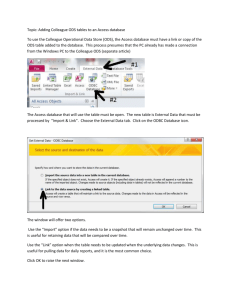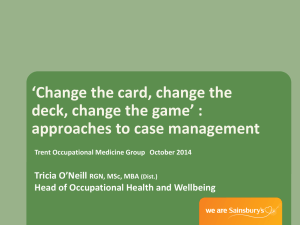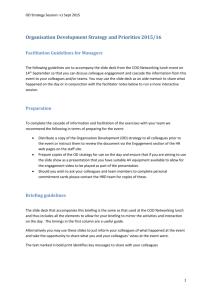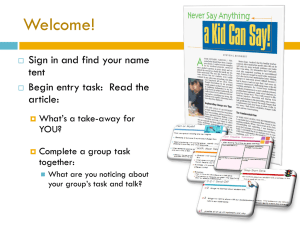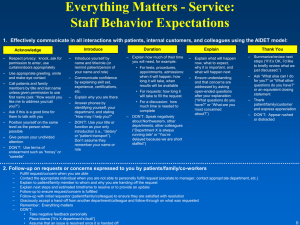Presentation by Sorcha Lowry, See Change
advertisement
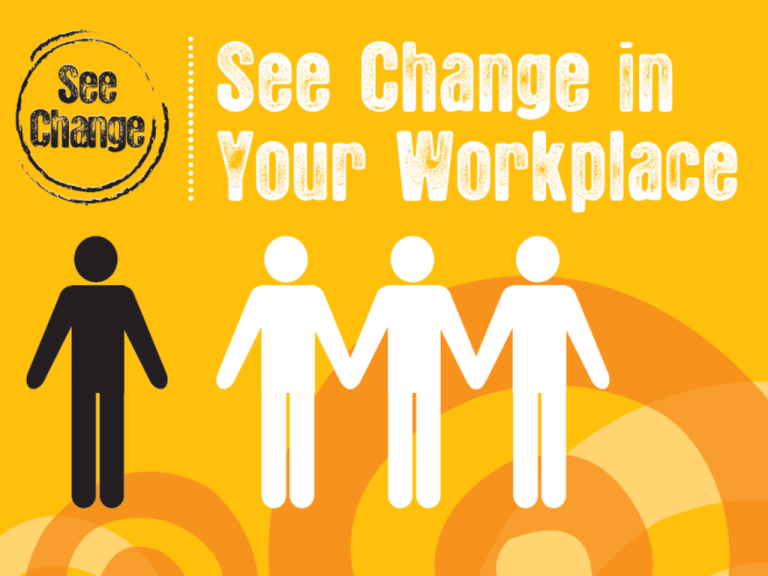
MENTAL HEALTH? Hallucinations Helplines MENTAL HEALTH? Manic depression One flew over the cuckoos nest What is mental health? Whether you call it wellbeing, emotional welfare or mental health, it’s key to living a fulfilling life. How you think and feel about yourself and your life affects how you behave and how well you cope when times are tough. It affects your ability to make the most of the opportunities that come your way and play a full part in your family, workplace, community and among friends. It’s also closely linked with your physical health. . You bring what’s happening in your life to work with you every day: That’s no-one’s fault. It’s just the way we are. Mental health affects how you respond to pressure and react to events. What are mental health problems? Mental health problems affect the way you think, feel and behave. About ¼ of the population experience some kind of mental health problem in any one year. •Anxiety and depression affect 1 in 10 at any one time. •Only 1-2% of people experience a severe mental illness, such as bipolar disorder or schizophrenia. People with mental health problems can and do recover . (Kahlil) That’s enough to fill Croke Park 14 times over ! What is stigma? Negative attitudes and behaviours based on fear, myths and misconceptions. Stigma can and does stop people coming forward for help. Stigma has been proven as a key barrier to recovery. People who experience mental health problems report that stigma can often be as difficult to deal with as the experience of being unwell. Stigma has a social and human cost for the individual; limiting access to employment, housing, education and social participation. Stigma is felt most acutely by groups at higher risk of suicide, including males aged 18-24. . Social contact and the open sharing of personal experience with a mental health problem is a highly effective way to create understanding and challenge stigma. What do we know about Irish attitudes? 1 in 2 Irish people would not want others to know if they had a mental health problem People in the workplace along with farmers & young males are most affected by stigma: •Least likely to be open or talk about their own & others; mental health •Some to the extent that it would prevent them from seeking help. •57% believe that being open about a mental health problem at work would have a negative impact on job and career prospects, up from 48% in 2010. •47% believe that being open about a mental health problem at work would have a negative effect on a person’s relationship with colleagues, up from 36% in 2010. What does the law say? The Employment Equality Acts 1998-2011 ban employment-related discrimination. . • Advertising • Equal pay • Access to employment • Vocational training and work experience • Terms and conditions of employment • Promotion or re-grading • Classification of posts • Dismissal • Collective agreements. Reasonable accommodation under Equality legislation Employers are obliged to make appropriate measures so that employees who have a disability, including people with experience of mental health problems, can: • Have access to employment • Participate or advance in employment • Undertake training Reasonable accommodation in practise • Time off to attend medical appointments • Mentoring and peer support within the workplace • Consulting with an employee in order to accommodate their return to work • Adjusting an employee’s attendance hours or allowing them to work at home • Relieving an employee of certain tasks, and substituting other equivalent duties, in consultation with the employee • Provision of relevant training to support the employee to carry out their duties. •It may be useful to get additional advice, with the agreement of the employee, from the employee’s doctor, an occupational health specialist, a mental health service or a mental health support group. How to know if a colleague is experiencing diffuculties? There is no simple way of knowing if someone has a mental health problem and sometimes you don’t need to know. It’s more important to respond sensitively to someone who seems troubled than to find out whether or not they have a diagnosis. . . Anxiety Depression How to recognise if someone is in need of support People who are depressed may •be tearful, nervous or irritable •have low confidence •lose interest in their work and find it difficult to concentrate •feel overwhelmed & unable to deliver on expectations •lose their appetite •get tired easily At worst, they may feel suicidal. People experiencing anxiety may seem unusually worried or fearful in most situations. They may: • appear pale and tense •be easily startled by everyday sounds •have difficulty concentrating • be irritable • try to avoid certain situations •experience panic attacks Responding to a crisis Breaking down in tears, having a panic attack, feeling suicidal, or losing touch with reality can be a response to a build up of stress at work or at home. •Listen to your colleague without making judgements •Reassure them and offer practical information or support •Ask your colleague what would help them •Avoid confrontation, even if they become agitated or aggressive •Ask them if there is anyone you would like them to contact perhaps a friend, relative or carer •Encourage them to get appropriate professional help If you are aware that a colleague has self-harmed, make sure they get the first aid they need You may feel a sense of crisis too, but it’s important to stay calm yourself.. Responding to a crisis Suicidal It is very important to encourage someone to get immediate help intent through Samaritans, GP, family, friends or mental health services. You can ask your colleague how they are feeling and let them know that you are available to listen. Delusions Seeing, hearing or believing things that no-one else does can be the symptom of a mental illness. It can be frightening and upsetting. Gently remind your colleague who you are and why you are there. Don’t reinforce or dismiss their experiences, but acknowledge how the symptoms are making your colleague feel. Panic Stay with the person. Explain to them what is happening and let them attacks know that this wIIl pass. Try to get them to focus on deep breathing. Helping someone with a mental health problem through a crisis can be Protect stressful and upsetting. It is important to talk it through with your HR yourself manager or boss or a friend without identifying your colleague. Samaritans are there for you too. How to support employees and colleagues Although you can’t solve a someone else’s problems, knowing the basics about how to support your colleague can really help you – and them. Working in a supportive team that cares about the wellbeing of its members can make a huge difference to their ability to cope. How to support a colleague It’s good to talk:. Let your colleague know that you are there if they want to talk. Let your colleague share as much or as little as they want to Ask questions to help you understand but tell them that they don’t have to answer any questions that make them feel uncomfortable. Don’t try to diagnose someone or second guess their feelingsTry not to make assumptions or jump in too quickly with your own solutions. Keep your questions open-ended Try to keep your language neutral. Give the person time to answer & try not to grill them with too many questions. Reassure them that what they tell you is private Ask if they have discussed it with others & if they do or don’t want you to mention it to anyone else. Talk about wellbeing Talk about ways of de-stressing & ask your colleague if there is anything that they find helps. The power of words Jokes and banter may seem harmless, but can be hurtful & makes it less likely they will open up. This can be classed as harassment & bullying. What can a manager do? Take time to talk to the person privately: Ask if something is wrong but take your steer from them. Be honest in assesing the employees recent performance. Don’t make assumptions about what someone can & can’t do. In the language you use & the attention you give them, treat them with respect & act as a model to encourage other colleagues to do the same. Be aware that changes, restructuring or the risk of redundancy can be especially difficult. Suggest they ask for advice from your occupational health advisor or contact any support service your organisation uses. Keep the dialogue going. Tips on supportive listening Sometimes the most important part of talking is letting the other person know that you are listening. Listen carefully to what your colleague is saying to you and repeat what they have said back to them to ensure you have understood it. Try to interpret the words in terms of feelings so you could respond ‘I can see that it makes you very unhappy when…’ You don’t have to agree with what your colleague is saying, but by showing you understand how they feel, you are letting them know that you respect their feelings. If you disagree, be open and honest about it, and continue to listen to what they have to say. Making returning to work easy Managers Returning to work after a period of ill health can be exhausting. Managers could explore phased return arrangments for employees. HR & occupational health advisors can advise on what is reasonable. Colleagues Keep in touch to overcome possible awkwardness. Ask the person who is off work what they would like their colleagues to be told –maintain confidentiality while letting others understand what’s happening Invite them out to staff social & leisure activities as normal Send cards & call your colleague just as you would if they had a physical health problem Have a ‘cup of tea’ policy where someone can come into the office informally before returning to work. Create an open workplace culture Through open conversation & a supportive environment, a cultural shift can occur where employees begin to feel secure in starting a discussion about their mental health. Managerial level Staff-wide Public engagement

